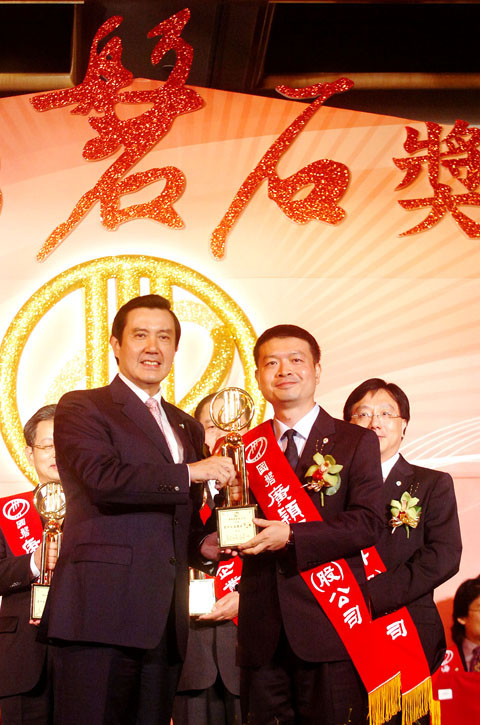Twelve local small and medium-sized enterprises (SMEs) and six overseas Taiwanese businesses yesterday received National Awards for their outstanding performance from the Ministry of Economic Affairs yesterday.
Among the 12 winning SMEs were Sheh Fung Screws Co (世豐螺絲廠公司), Hightech Electronic Products Tech Co (東林科技) and Tung Yu Hydraulic Machinery Co (東繁油壓機械).
During his opening remarks, Minister of Economic Affairs Yiin Chii-ming (尹啟銘) vowed that the government would provide SME credit guarantees of up to NT$6 billion (US$184.2 million) next year while boosting loans to SMEs to NT$300 billion a year, which is equivalent to one-tenth of the nation’s total NT$3 trillion loan balance.

PHOTO: GEORGE TSORNG, TAIPEI TIMES
President Ma Ying-jeou (馬英九) yesterday lauded the resilience of domestic SMEs, which he called a pillar to social stability.
Ma said, that there were 1.24 million SMEs in Taiwan, which account for 98 percent of all businesses here and take up 77 percent of the nation’s labor force.
He also reiterated confidence in the economy, saying the nation’s fundamentals were sound despite the global financial turbulence.
Taiwan has US$250 billion in foreign reserves and more than US$12,000 in GDP per capita, which lags only behind Hong Kong and Singapore in Asia.
The six overseas award-winning companies are Dental Implant Institute (美國拉斯維加植牙醫學中心), Asian Legend Inc (味香村連鎖飲食企業集團), Lightel Technologies Inc (萊特爾科技), Dallas/Fort Worth Technology Inc (美國達福科技), Chiu-Nichi Agro Resources Phil, Inc (綠源農業資源) and Telamon Corp (德利盟).

MULTIFACETED: A task force has analyzed possible scenarios and created responses to assist domestic industries in dealing with US tariffs, the economics minister said The Executive Yuan is tomorrow to announce countermeasures to US President Donald Trump’s planned reciprocal tariffs, although the details of the plan would not be made public until Monday next week, Minister of Economic Affairs J.W. Kuo (郭智輝) said yesterday. The Cabinet established an economic and trade task force in November last year to deal with US trade and tariff related issues, Kuo told reporters outside the legislature in Taipei. The task force has been analyzing and evaluating all kinds of scenarios to identify suitable responses and determine how best to assist domestic industries in managing the effects of Trump’s tariffs, he

TIGHT-LIPPED: UMC said it had no merger plans at the moment, after Nikkei Asia reported that the firm and GlobalFoundries were considering restarting merger talks United Microelectronics Corp (UMC, 聯電), the world’s No. 4 contract chipmaker, yesterday launched a new US$5 billion 12-inch chip factory in Singapore as part of its latest effort to diversify its manufacturing footprint amid growing geopolitical risks. The new factory, adjacent to UMC’s existing Singapore fab in the Pasir Res Wafer Fab Park, is scheduled to enter volume production next year, utilizing mature 22-nanometer and 28-nanometer process technologies, UMC said in a statement. The company plans to invest US$5 billion during the first phase of the new fab, which would have an installed capacity of 30,000 12-inch wafers per month, it said. The

Taiwan’s official purchasing managers’ index (PMI) last month rose 0.2 percentage points to 54.2, in a second consecutive month of expansion, thanks to front-loading demand intended to avoid potential US tariff hikes, the Chung-Hua Institution for Economic Research (CIER, 中華經濟研究院) said yesterday. While short-term demand appeared robust, uncertainties rose due to US President Donald Trump’s unpredictable trade policy, CIER president Lien Hsien-ming (連賢明) told a news conference in Taipei. Taiwan’s economy this year would be characterized by high-level fluctuations and the volatility would be wilder than most expect, Lien said Demand for electronics, particularly semiconductors, continues to benefit from US technology giants’ effort

‘SWASTICAR’: Tesla CEO Elon Musk’s close association with Donald Trump has prompted opponents to brand him a ‘Nazi’ and resulted in a dramatic drop in sales Demonstrators descended on Tesla Inc dealerships across the US, and in Europe and Canada on Saturday to protest company chief Elon Musk, who has amassed extraordinary power as a top adviser to US President Donald Trump. Waving signs with messages such as “Musk is stealing our money” and “Reclaim our country,” the protests largely took place peacefully following fiery episodes of vandalism on Tesla vehicles, dealerships and other facilities in recent weeks that US officials have denounced as terrorism. Hundreds rallied on Saturday outside the Tesla dealership in Manhattan. Some blasted Musk, the world’s richest man, while others demanded the shuttering of his